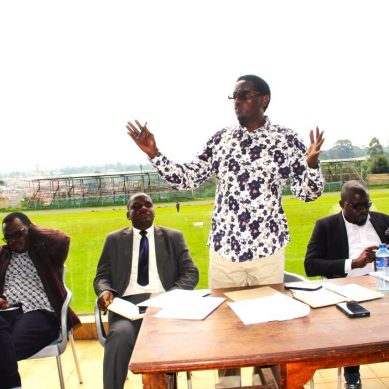
Kenya is on the cusp of embracing genetically modified organisms (GMOs) after the National Biosafety Authority kicked off a nationwide campaign to collect views from maize farmers before the variety is integrated into the country’s food system.
However, there is fear the authority is acting at the behest of major world agrochemicals companies out to make a killing from unsuspecting third world governments and scientists who lack the necessary biotechnology wherewithal to determine the safety of the genetically engineered plants.
Maize or corn, is a staple that is synonymous with food security in Kenya and the wider eastern, central and southern Africa, where it is ubiquitous on farmlands. However, GMO maize presents a major test to farmers in the East African nation where consumers have become wary and suspicious of proponents of GE crops being propagated by the likes of Melinda & Bill Gates Foundation, who are championing the acceptance of genetically altered organisms without accompanying evidence of their health and environmental safety.
Countrywide public participation, led by National biosafety Authority (NBA) kicked off in December and will be an engagement with farmers and consumers in maize-growing regions in in western in Kakamega, Uasin Gishu counties, and in the east in Machakos County before being rolled out in the country’s breadbasket of Trans Nzoia County.
NBA Acting Director of Biosafety Research and Compliance Josphat Muchiri confirmed the authority’s readiness for the exercise in the listed counties, adding that the campaign would be expanded to cover all maize-producing regions in Kenya.
“We value the input of various stakeholders and that is why we are moving across the country to listen to them, including our farmers,” said Muchiri.
The assurance, however, falls short of the requisite confidence that comes with civic education. Most farmers are not equipped with sufficient scientific knowledge to make informed judgement and it is feared the campaign is designed to generate a chorus that would be commuted to a vote of confidence and in turn be sued to clandestinely introduce GMOs in the country.
Without its own capacity to verify the environmental and biological safety of GMO there are strong doubts that NBA is not undertaking public participation on its won volition. The perception that NBA is a pawn in the wider scheme by Big Agri to control the agriculture is expected to generate serious concerns even as the move is backed by Kenya’s President William Ruto.
The campaign for adoption of GMO maize kicked off barely weeks after a court in the US raised serious ethical questions on the safety and quality of the engineered crop species given the involvement of Monsanto, which has for decades has been marketing the embrasure of the self-terminating seeds with the intention controlling the food industry worldwide.
In recent article citing a court ruling Tell Media and The Defender reported that in a precedential victory for food and environmental safety, a federal district court ruled on December 3, 2024, that genetically engineered (GE) organisms must be regulated. The court’s ruling overturns the 2020 rule overhaul by the first Trump administration that had eliminated most government oversight over GE crops, trees and grasses.
“This is a critical victory on behalf of farmers, the planet and scientific integrity,” said George Kimbrell, legal director for the lead plaintiff Centre for Food Safety, and counsel in the case. The US Department of Agriculture (USDA) “tried to hand over its job to Monsanto and the pesticide industry and the court held that capitulation contrary to both law and science.”
The article adds that the ruling was a rebuke of the first Trump administration’s efforts to practically eliminate oversight of novel GE technology and instead let industry self-regulate. Previously, nearly all GE plants went through agency approval before experimental planting and again before any commercial use.
The Centre for Food Safety and allies sued the USDA in 2021 to reverse this rollback, arguing that the rule change violated numerous environmental laws, including the Endangered Species Act, the National Environmental Policy Act and the Plant Protection Act.
In Kenya, the countrywide views-gathering exercise targets largescale maize growing counties regarded as foodbasket. In Kakamega County, the forum was held at the regional commissioner’s office while the one in Machakos was at the Machakos Agricultural College. In Uasin Gishu, the exercise will be at University of Eldoret.
The venues of the meetings, however, defeat the very meaning of “public participation” as attendance is by invite. The forums have not also been publicised to make sense of the meaning of public participation.
“We will be here to listen to our stakeholders and therefore call upon them to turn up in large numbers and share their crucial views,” he added.
The application for placement on the market of genetically modified maize (Zea mays) commonly known as Bt maize (MON 89034) was made by the Kenya Agricultural and Livestock Research Organization (KALRO) and the African agricultural technology foundation (AATF) last month.
The BT maize are expected to address the challenges of the fall armyworms and maize stem borers which are the two major pests of maize in Kenya and the region.
“The authority is mandated, to among other things, promote awareness and education among the general public on matters relating to biosafety, a function that it has taken seriously through various activities across the Country,” said Muchiri.
He added, “This is also to let Kenyans know that the authority has an obligation to undertake public participation and that is the reason the information on the BT maize was placed in two widely circulated newspapers, the weekly Kenya Gazette and on NBA’s website. This is the initial public consultation to inform the authority in the biosafety approval request.”
In the US, the court held that the regulations violated the Plant Protection Act and the Administrative Procedure Act.
The court’s decision sharply criticised the defendant federal agency for its abrupt reversal after more than a decade of recognising the harms of novel GE technology.
The court at various points held the agency decision was in “direct conflict with the conclusion of its own experts,” and was based on “perception and beliefs” that are merely “asserted as fiat untethered to a clear and sound analysis.”
Despite USDA’s repeated admissions of the need for stronger – not lesser – regulations, the rule unlawfully ignored these concerns of GE crops’ risks. As such, the court found that the rule did not address “a single one of these issues” that the agency itself previously raised.
In Kenya, NBA says that besides publication in the print media, the authority is concurrently engaging other channels of communication and public awareness, including social media platforms.
Against the backdrop ruling in the US, Kenyan consumers risk exposure to harmful impact of GMOs as the country still relies on America, Europe, China and Japan on biotechnology.
In the case of the US, the court found that the exemption of GE crops was “repudiated” by the “scientific evidence in the record,” specifically the conclusions and recommendations from the National Academies of Science.
It said the agency’s errors were “significant,” forcing it to strike down the rules based on those violations alone, determining it unnecessary to yet reach the Endangered Species Act and National Environmental Policy Act claims.
The plaintiffs in the case were the National Family Farm Coalition, Friends of the Earth, Pesticide Action Network, Centre for Environmental Health, Centre for Biological Diversity and Centre for Food Safety – all represented by counsel from the Centre for Food Safety.
In commercial production for several decades, the court noted, GE crop systems are well known to cause several significant agricultural and environmental harms. Such harms include organic and conventional crop contamination from GE crops and market closures, the significant increase in pesticide use, and the proliferation of pesticide-resistant “superweeds.”
Because the vast majority of genetically modified organisms are engineered to be resistant to weed-killing pesticides, they have dramatically increased the amount of these chemicals sprayed in US agriculture.
These GE herbicide-resistant crop systems have triggered an epidemic of herbicide-immune weeds, which now infest 120 million acres, leading to a toxic spiral of weeds immune to ever more herbicides, and increased spraying of toxic chemical cocktails to kill them.
Genetically engineered crops, including rice, alfalfa, corn and many others, have caused farmers billions of dollars in market losses from transgenic contamination of conventional or organic crops, as food companies and foreign markets reject tainted supplies.
“These initiatives are meant to educate the public on GMOs, safety assessment procedures and allow interactive sessions with members of the public. It’s further underscored that before the commercialisation of the BT maize, other regulatory approvals including environmental impact assessment (EIA) and national performance trials will be required and the public will further be engaged at those stages,” Muchiri explained.
The authority pledged that it would continue to discharge its mandate of ensuring safety of human, animal health and protection of the environment in accordance with the biosafety act.
The decision to conduct public engagements is in line with the provisions of the Biosafety Act (2009) section 19(4) and regulation 12(3)(a) of the biosafety (environmental release) regulations (2011) that requires the authority to notify the public on receiving an application for environmental release or open field cultivation, and placing on the market of genetically modified products.
The authority is mandated to exercise supervision and control over the development, transfer, handling and use of genetically modified organisms with a view to ensuring safety to human and animal health as well as the provision of adequate level of protection to the environment.
- A Tell report / By Isaac Wakhungu Andanje







